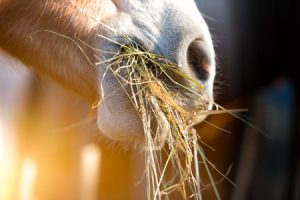
Horses’ diets vary based on where they live in the country and what season it is. Depending on the climate, there could be some dangerous things for your horse to munch on. If you pay attention to what your horse consumes and ensure they avoid a few key things, they will feel great and perform their best!
Where to Start?
There are a few rules you should always follow regarding your horse’s diet:
- Always supply fresh water
- Maximize forage intake
- Keep an eye on vitamin and mineral intake
- Change feedstuffs regularly
- Ensure your horse’s teeth are healthy and ready for chewing
What Should Your Horse Avoid?
There are a few key things you should avoid feeding your horse to keep them healthy.
Bran Mash
Bran mash used to be a widely accepted addition to your horse’s diet, but more and more barns have been staying away from this particular item in recent years. Bran mash is very different from what your horse normally eats daily. Barn keepers back in the day fed their horses bran mash occasionally because it had a laxative effect. However, that effect proves that your horse’s digestive system does not tolerate the bran mash.
If you must change your horse’s diet because you’re traveling with them, or they are having issues with their digestion, make all changes slowly and gradually: it’s important not to shock your horse’s system.
If your horse is sick or too tired to have a normal appetite on any given day, try enticing him to eat with a carrot or an apple rather than bran. Most horses can’t resist the flavor, but it wreaks havoc on their systems.
Certain Fruits and Vegetables
Speaking of fruits, you might be tempted to let your horse snack on other items you have rolling around in the fridge but remember, not all fruit and veggies are good snack alternatives for your horse. Things like avocado, broccoli, brussels sprouts, and some other veggies can give your horse a stomachache and cause some digestive problems. Veggies that are okay to share with your horse include carrots, squash, celery, green beans, and lettuce. Most fruits are okay to share but ensure you remove any seeds or pits.
The Dangers of Grazing
Your horse probably loves spending a long afternoon out in the fields grazing, but like any good thing, too much of it can be bad. Limiting your horse’s daily grazing time is important, and here’s why!
Laminitis
Too much grazing can trigger a condition known as laminitis, which is an inflammation in the foot where the soft tissue attaches the horse’s bone to the hoof. The inflammation can be very painful, and if it’s not immediately treated, it can lead to loss of use of your horse’s foot.
Grazing can trigger laminitis because grass stores starches and sugars, and over-eating those starches and sugars isn’t healthy for your horse.
Keeping your pastures mowed can prevent grazing, which will, in turn, prevent laminitis. It’s important to keep an eye on your horse and watch for signs of swelling in their necks or feet. If you notice these symptoms and suspect laminitis, consult with your vet right away.
Buttercups
Grazing poses another unique threat to your horse: the presence of buttercups. While the flowers may seem harmless to you, the leaves and stems of buttercups contain ranunculin, which can cause a toxic blistering agent when crushed or chewed.
Horses that graze in fields where buttercups abound can suffer from swollen lips and facial tissue, blistering in the mouth and face, and, eventually, bloody diarrhea caused by the toxins building up in the horse’s digestive tract.
Most horses don’t like the taste of buttercups since they are so bitter, so they may avoid them on their own, but if you don’t have much else to graze on in the pasture, a desperate horse may have a buttercup snack.
Keep buttercups mowed, and make sure there’s plenty of other snackable grass for your horse to munch on.
Weigh Your Horses Food
It can be hard for anyone to stick to a diet, especially if you’re not exactly sure how much food you eat during the day. It’s the same for your horse, so weighing their food is necessary to maintain a healthy diet.
A horse should typically eat between 1.5 and 2% of their body weight in dry matter each day. Weighing your horse’s food, and keeping an eye on their grazing, can prevent over or under-feeding.
Along with a proper diet, horses need a carefully crafted shelter to rest and take cover from the elements. Deer Creek Structures has the run-in sheds and custom barns you need to keep your horse safe and comfortable. We will walk you through your customization choices and build directly to your specifications.
Contact us at (254)546-2276 to learn about our services and get an estimate today!
